Legal Analysis: Directors' Duties and Liabilities in DEF Ltd Case
VerifiedAdded on 2023/01/20
|7
|1804
|87
Report
AI Summary
This report provides a comprehensive analysis of directors' duties in the context of DEF Ltd, a mining company. It examines the legal responsibilities of Rocky (CEO), Drago (CFO), and Clubber (Chairperson) in relation to their handling of the company's mining operations, focusing on potential breaches of duty, including good faith, care and diligence, avoidance of conflicts of interest, and avoidance of insolvent trading. The report applies relevant corporate law principles, including the Salomon case and sections of the Corporations Act 2001, to assess the directors' actions. It also explores potential defenses available to the directors, such as the business judgment rule. The report further distinguishes the standard of care expected of Drago, the CFO, from that of the other directors, highlighting the CFO's heightened responsibilities. Finally, the report concludes that all three directors may have violated several directorial duties, while the defenses available to Rocky and Clubber may not be fully applicable to Drago due to his position as CFO. The report references case law and legislation to support its analysis.
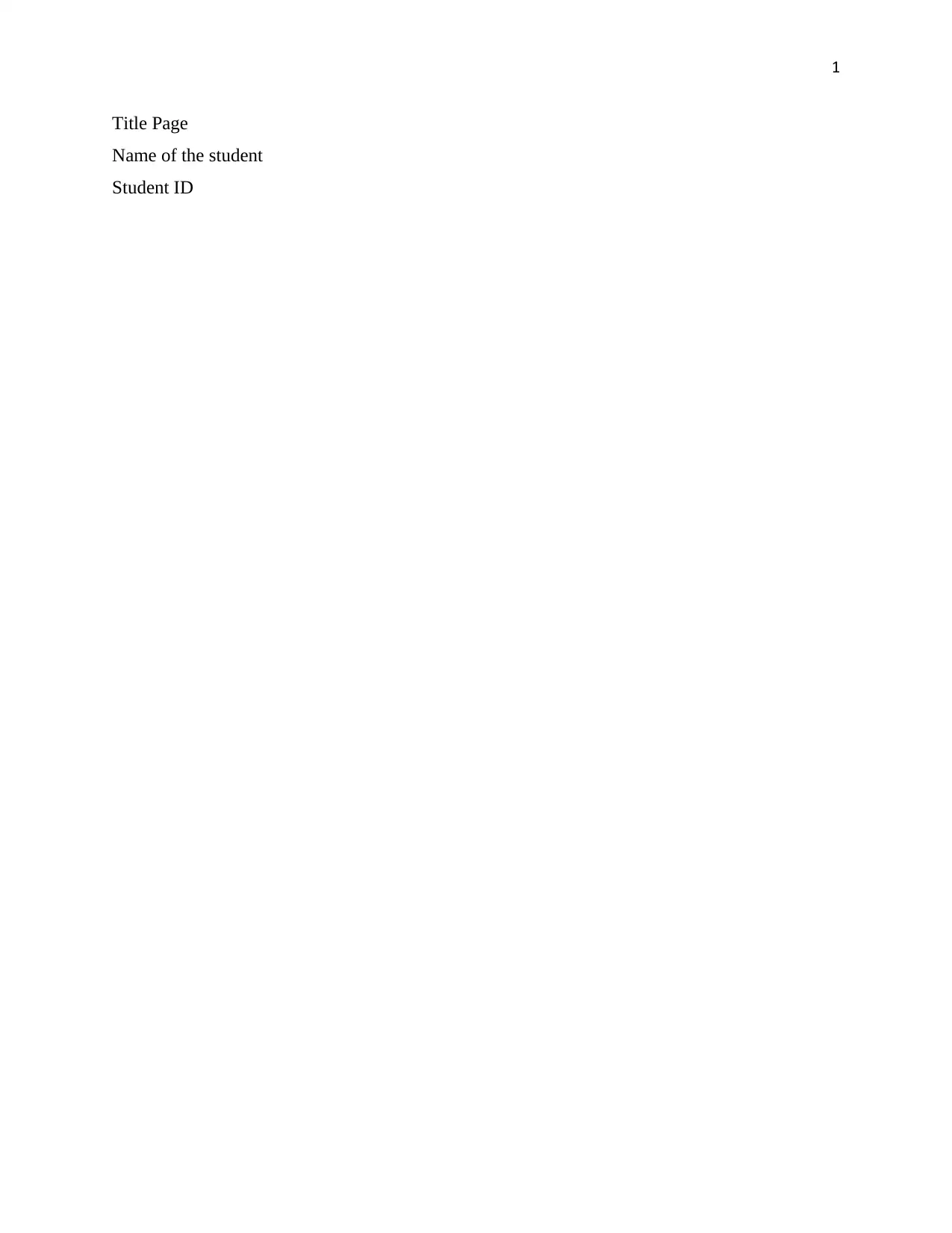
1
Title Page
Name of the student
Student ID
Title Page
Name of the student
Student ID
Paraphrase This Document
Need a fresh take? Get an instant paraphrase of this document with our AI Paraphraser
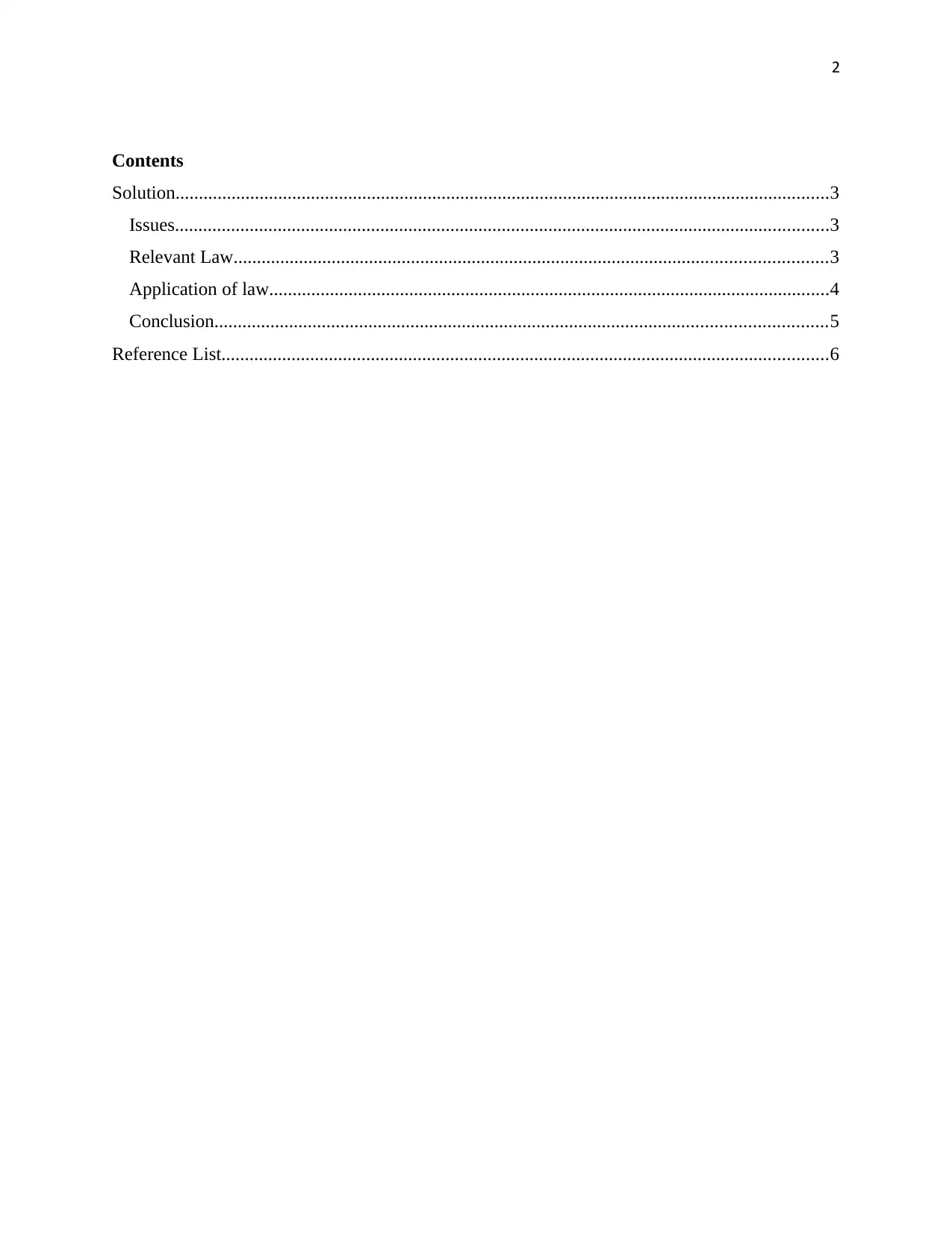
2
Contents
Solution............................................................................................................................................3
Issues............................................................................................................................................3
Relevant Law...............................................................................................................................3
Application of law........................................................................................................................4
Conclusion...................................................................................................................................5
Reference List..................................................................................................................................6
Contents
Solution............................................................................................................................................3
Issues............................................................................................................................................3
Relevant Law...............................................................................................................................3
Application of law........................................................................................................................4
Conclusion...................................................................................................................................5
Reference List..................................................................................................................................6
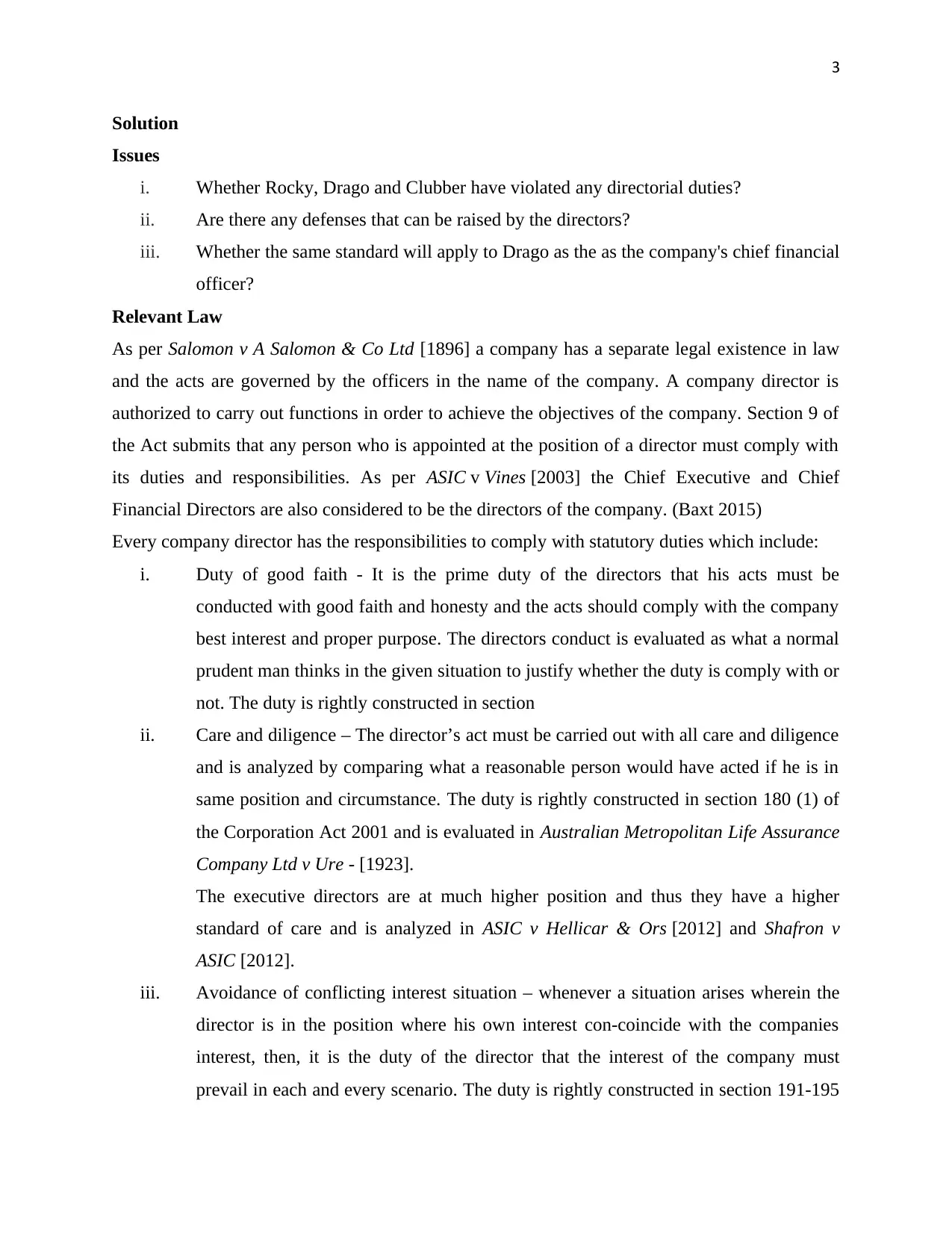
3
Solution
Issues
i. Whether Rocky, Drago and Clubber have violated any directorial duties?
ii. Are there any defenses that can be raised by the directors?
iii. Whether the same standard will apply to Drago as the as the company's chief financial
officer?
Relevant Law
As per Salomon v A Salomon & Co Ltd [1896] a company has a separate legal existence in law
and the acts are governed by the officers in the name of the company. A company director is
authorized to carry out functions in order to achieve the objectives of the company. Section 9 of
the Act submits that any person who is appointed at the position of a director must comply with
its duties and responsibilities. As per ASIC v Vines [2003] the Chief Executive and Chief
Financial Directors are also considered to be the directors of the company. (Baxt 2015)
Every company director has the responsibilities to comply with statutory duties which include:
i. Duty of good faith - It is the prime duty of the directors that his acts must be
conducted with good faith and honesty and the acts should comply with the company
best interest and proper purpose. The directors conduct is evaluated as what a normal
prudent man thinks in the given situation to justify whether the duty is comply with or
not. The duty is rightly constructed in section
ii. Care and diligence – The director’s act must be carried out with all care and diligence
and is analyzed by comparing what a reasonable person would have acted if he is in
same position and circumstance. The duty is rightly constructed in section 180 (1) of
the Corporation Act 2001 and is evaluated in Australian Metropolitan Life Assurance
Company Ltd v Ure - [1923].
The executive directors are at much higher position and thus they have a higher
standard of care and is analyzed in ASIC v Hellicar & Ors [2012] and Shafron v
ASIC [2012].
iii. Avoidance of conflicting interest situation – whenever a situation arises wherein the
director is in the position where his own interest con-coincide with the companies
interest, then, it is the duty of the director that the interest of the company must
prevail in each and every scenario. The duty is rightly constructed in section 191-195
Solution
Issues
i. Whether Rocky, Drago and Clubber have violated any directorial duties?
ii. Are there any defenses that can be raised by the directors?
iii. Whether the same standard will apply to Drago as the as the company's chief financial
officer?
Relevant Law
As per Salomon v A Salomon & Co Ltd [1896] a company has a separate legal existence in law
and the acts are governed by the officers in the name of the company. A company director is
authorized to carry out functions in order to achieve the objectives of the company. Section 9 of
the Act submits that any person who is appointed at the position of a director must comply with
its duties and responsibilities. As per ASIC v Vines [2003] the Chief Executive and Chief
Financial Directors are also considered to be the directors of the company. (Baxt 2015)
Every company director has the responsibilities to comply with statutory duties which include:
i. Duty of good faith - It is the prime duty of the directors that his acts must be
conducted with good faith and honesty and the acts should comply with the company
best interest and proper purpose. The directors conduct is evaluated as what a normal
prudent man thinks in the given situation to justify whether the duty is comply with or
not. The duty is rightly constructed in section
ii. Care and diligence – The director’s act must be carried out with all care and diligence
and is analyzed by comparing what a reasonable person would have acted if he is in
same position and circumstance. The duty is rightly constructed in section 180 (1) of
the Corporation Act 2001 and is evaluated in Australian Metropolitan Life Assurance
Company Ltd v Ure - [1923].
The executive directors are at much higher position and thus they have a higher
standard of care and is analyzed in ASIC v Hellicar & Ors [2012] and Shafron v
ASIC [2012].
iii. Avoidance of conflicting interest situation – whenever a situation arises wherein the
director is in the position where his own interest con-coincide with the companies
interest, then, it is the duty of the director that the interest of the company must
prevail in each and every scenario. The duty is rightly constructed in section 191-195
⊘ This is a preview!⊘
Do you want full access?
Subscribe today to unlock all pages.

Trusted by 1+ million students worldwide
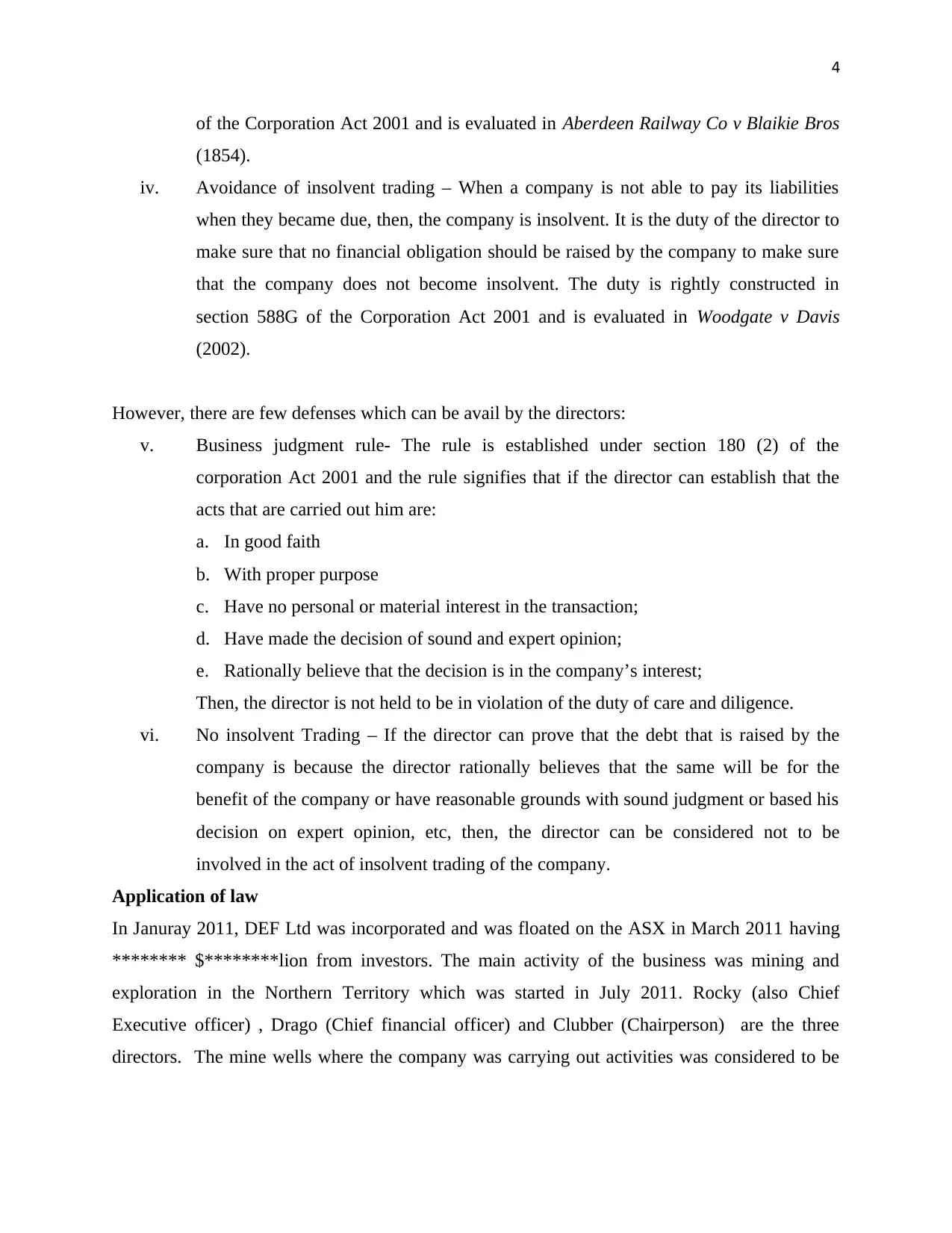
4
of the Corporation Act 2001 and is evaluated in Aberdeen Railway Co v Blaikie Bros
(1854).
iv. Avoidance of insolvent trading – When a company is not able to pay its liabilities
when they became due, then, the company is insolvent. It is the duty of the director to
make sure that no financial obligation should be raised by the company to make sure
that the company does not become insolvent. The duty is rightly constructed in
section 588G of the Corporation Act 2001 and is evaluated in Woodgate v Davis
(2002).
However, there are few defenses which can be avail by the directors:
v. Business judgment rule- The rule is established under section 180 (2) of the
corporation Act 2001 and the rule signifies that if the director can establish that the
acts that are carried out him are:
a. In good faith
b. With proper purpose
c. Have no personal or material interest in the transaction;
d. Have made the decision of sound and expert opinion;
e. Rationally believe that the decision is in the company’s interest;
Then, the director is not held to be in violation of the duty of care and diligence.
vi. No insolvent Trading – If the director can prove that the debt that is raised by the
company is because the director rationally believes that the same will be for the
benefit of the company or have reasonable grounds with sound judgment or based his
decision on expert opinion, etc, then, the director can be considered not to be
involved in the act of insolvent trading of the company.
Application of law
In Januray 2011, DEF Ltd was incorporated and was floated on the ASX in March 2011 having
******** $********lion from investors. The main activity of the business was mining and
exploration in the Northern Territory which was started in July 2011. Rocky (also Chief
Executive officer) , Drago (Chief financial officer) and Clubber (Chairperson) are the three
directors. The mine wells where the company was carrying out activities was considered to be
of the Corporation Act 2001 and is evaluated in Aberdeen Railway Co v Blaikie Bros
(1854).
iv. Avoidance of insolvent trading – When a company is not able to pay its liabilities
when they became due, then, the company is insolvent. It is the duty of the director to
make sure that no financial obligation should be raised by the company to make sure
that the company does not become insolvent. The duty is rightly constructed in
section 588G of the Corporation Act 2001 and is evaluated in Woodgate v Davis
(2002).
However, there are few defenses which can be avail by the directors:
v. Business judgment rule- The rule is established under section 180 (2) of the
corporation Act 2001 and the rule signifies that if the director can establish that the
acts that are carried out him are:
a. In good faith
b. With proper purpose
c. Have no personal or material interest in the transaction;
d. Have made the decision of sound and expert opinion;
e. Rationally believe that the decision is in the company’s interest;
Then, the director is not held to be in violation of the duty of care and diligence.
vi. No insolvent Trading – If the director can prove that the debt that is raised by the
company is because the director rationally believes that the same will be for the
benefit of the company or have reasonable grounds with sound judgment or based his
decision on expert opinion, etc, then, the director can be considered not to be
involved in the act of insolvent trading of the company.
Application of law
In Januray 2011, DEF Ltd was incorporated and was floated on the ASX in March 2011 having
******** $********lion from investors. The main activity of the business was mining and
exploration in the Northern Territory which was started in July 2011. Rocky (also Chief
Executive officer) , Drago (Chief financial officer) and Clubber (Chairperson) are the three
directors. The mine wells where the company was carrying out activities was considered to be
Paraphrase This Document
Need a fresh take? Get an instant paraphrase of this document with our AI Paraphraser
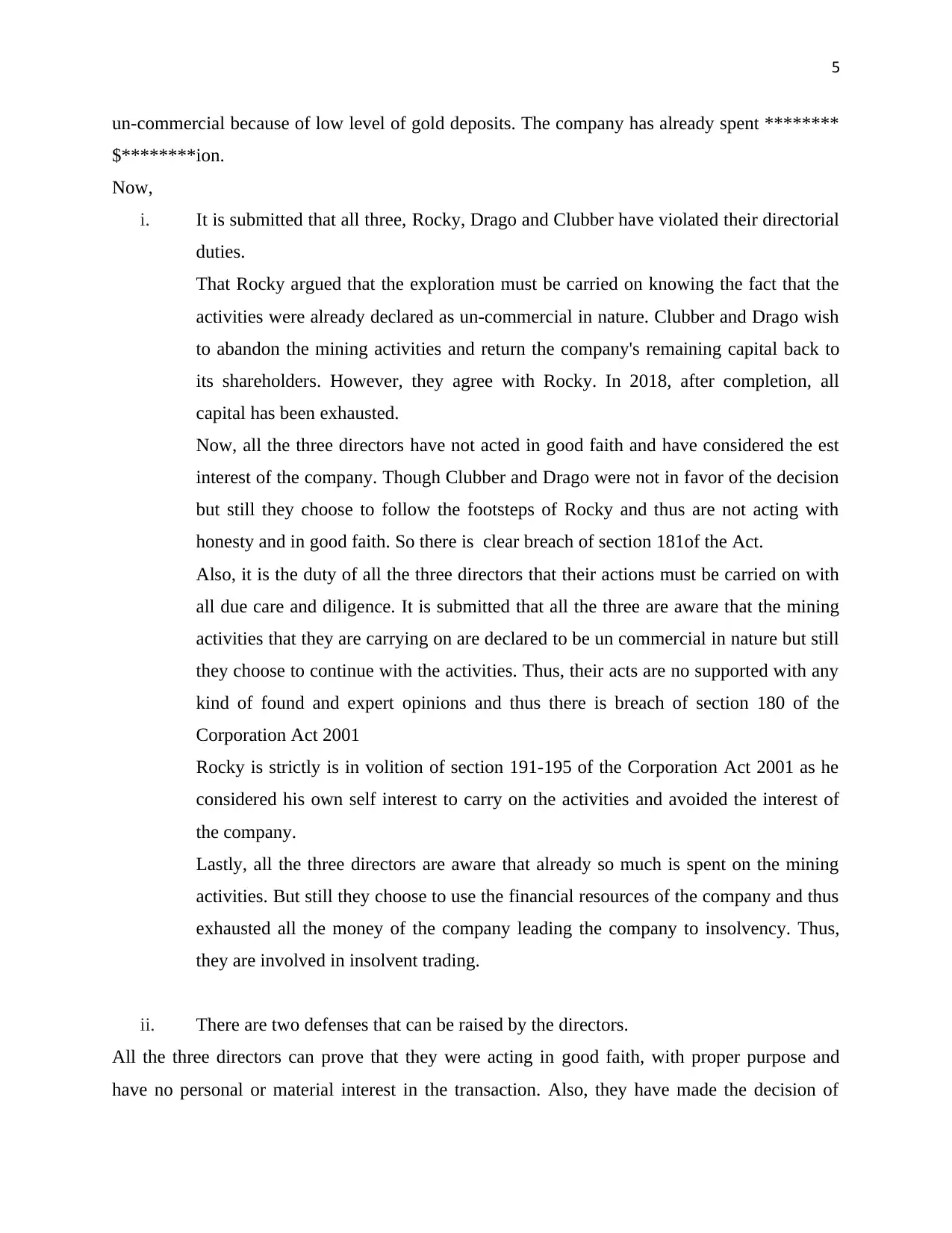
5
un-commercial because of low level of gold deposits. The company has already spent ********
$********ion.
Now,
i. It is submitted that all three, Rocky, Drago and Clubber have violated their directorial
duties.
That Rocky argued that the exploration must be carried on knowing the fact that the
activities were already declared as un-commercial in nature. Clubber and Drago wish
to abandon the mining activities and return the company's remaining capital back to
its shareholders. However, they agree with Rocky. In 2018, after completion, all
capital has been exhausted.
Now, all the three directors have not acted in good faith and have considered the est
interest of the company. Though Clubber and Drago were not in favor of the decision
but still they choose to follow the footsteps of Rocky and thus are not acting with
honesty and in good faith. So there is clear breach of section 181of the Act.
Also, it is the duty of all the three directors that their actions must be carried on with
all due care and diligence. It is submitted that all the three are aware that the mining
activities that they are carrying on are declared to be un commercial in nature but still
they choose to continue with the activities. Thus, their acts are no supported with any
kind of found and expert opinions and thus there is breach of section 180 of the
Corporation Act 2001
Rocky is strictly is in volition of section 191-195 of the Corporation Act 2001 as he
considered his own self interest to carry on the activities and avoided the interest of
the company.
Lastly, all the three directors are aware that already so much is spent on the mining
activities. But still they choose to use the financial resources of the company and thus
exhausted all the money of the company leading the company to insolvency. Thus,
they are involved in insolvent trading.
ii. There are two defenses that can be raised by the directors.
All the three directors can prove that they were acting in good faith, with proper purpose and
have no personal or material interest in the transaction. Also, they have made the decision of
un-commercial because of low level of gold deposits. The company has already spent ********
$********ion.
Now,
i. It is submitted that all three, Rocky, Drago and Clubber have violated their directorial
duties.
That Rocky argued that the exploration must be carried on knowing the fact that the
activities were already declared as un-commercial in nature. Clubber and Drago wish
to abandon the mining activities and return the company's remaining capital back to
its shareholders. However, they agree with Rocky. In 2018, after completion, all
capital has been exhausted.
Now, all the three directors have not acted in good faith and have considered the est
interest of the company. Though Clubber and Drago were not in favor of the decision
but still they choose to follow the footsteps of Rocky and thus are not acting with
honesty and in good faith. So there is clear breach of section 181of the Act.
Also, it is the duty of all the three directors that their actions must be carried on with
all due care and diligence. It is submitted that all the three are aware that the mining
activities that they are carrying on are declared to be un commercial in nature but still
they choose to continue with the activities. Thus, their acts are no supported with any
kind of found and expert opinions and thus there is breach of section 180 of the
Corporation Act 2001
Rocky is strictly is in volition of section 191-195 of the Corporation Act 2001 as he
considered his own self interest to carry on the activities and avoided the interest of
the company.
Lastly, all the three directors are aware that already so much is spent on the mining
activities. But still they choose to use the financial resources of the company and thus
exhausted all the money of the company leading the company to insolvency. Thus,
they are involved in insolvent trading.
ii. There are two defenses that can be raised by the directors.
All the three directors can prove that they were acting in good faith, with proper purpose and
have no personal or material interest in the transaction. Also, they have made the decision of
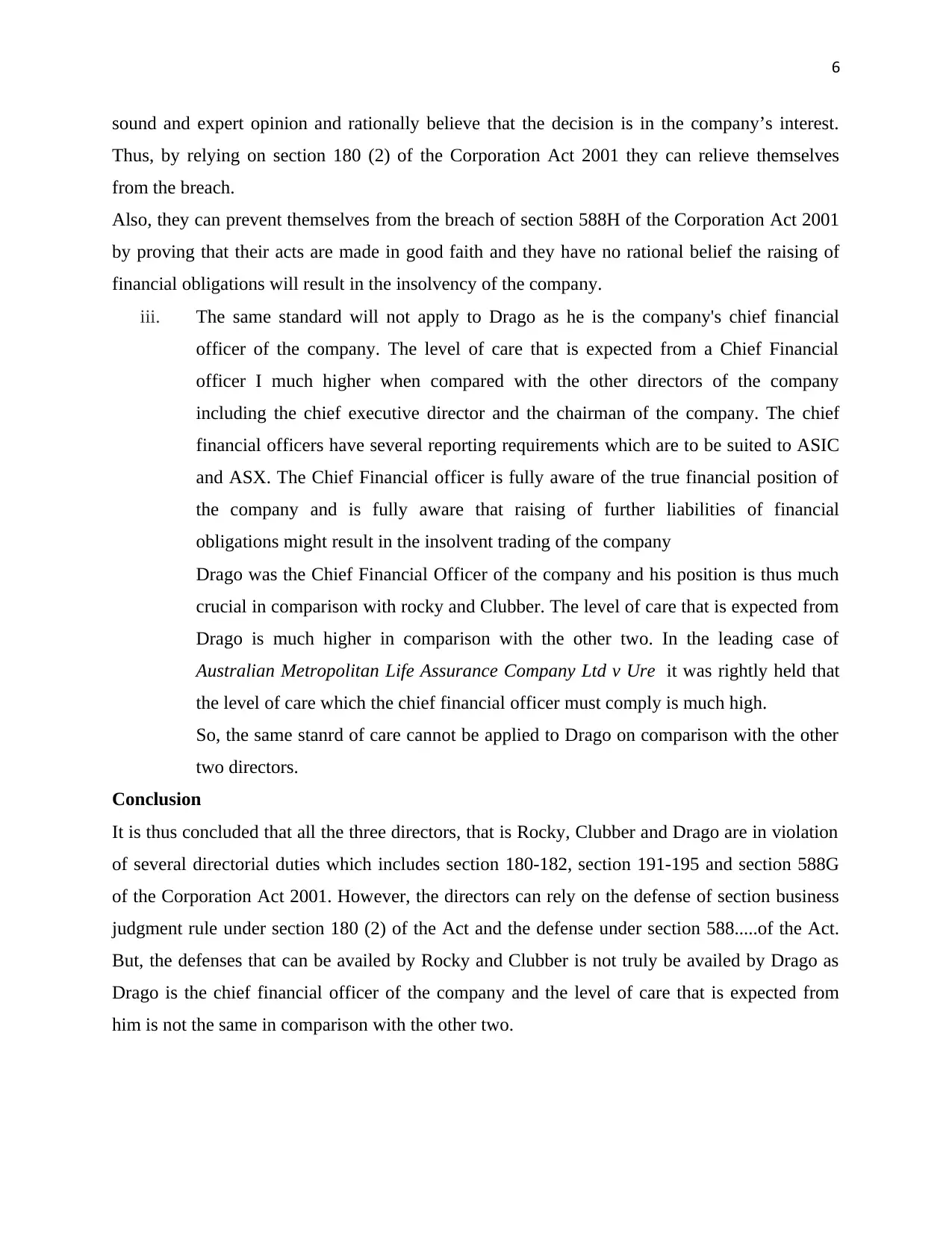
6
sound and expert opinion and rationally believe that the decision is in the company’s interest.
Thus, by relying on section 180 (2) of the Corporation Act 2001 they can relieve themselves
from the breach.
Also, they can prevent themselves from the breach of section 588H of the Corporation Act 2001
by proving that their acts are made in good faith and they have no rational belief the raising of
financial obligations will result in the insolvency of the company.
iii. The same standard will not apply to Drago as he is the company's chief financial
officer of the company. The level of care that is expected from a Chief Financial
officer I much higher when compared with the other directors of the company
including the chief executive director and the chairman of the company. The chief
financial officers have several reporting requirements which are to be suited to ASIC
and ASX. The Chief Financial officer is fully aware of the true financial position of
the company and is fully aware that raising of further liabilities of financial
obligations might result in the insolvent trading of the company
Drago was the Chief Financial Officer of the company and his position is thus much
crucial in comparison with rocky and Clubber. The level of care that is expected from
Drago is much higher in comparison with the other two. In the leading case of
Australian Metropolitan Life Assurance Company Ltd v Ure it was rightly held that
the level of care which the chief financial officer must comply is much high.
So, the same stanrd of care cannot be applied to Drago on comparison with the other
two directors.
Conclusion
It is thus concluded that all the three directors, that is Rocky, Clubber and Drago are in violation
of several directorial duties which includes section 180-182, section 191-195 and section 588G
of the Corporation Act 2001. However, the directors can rely on the defense of section business
judgment rule under section 180 (2) of the Act and the defense under section 588.....of the Act.
But, the defenses that can be availed by Rocky and Clubber is not truly be availed by Drago as
Drago is the chief financial officer of the company and the level of care that is expected from
him is not the same in comparison with the other two.
sound and expert opinion and rationally believe that the decision is in the company’s interest.
Thus, by relying on section 180 (2) of the Corporation Act 2001 they can relieve themselves
from the breach.
Also, they can prevent themselves from the breach of section 588H of the Corporation Act 2001
by proving that their acts are made in good faith and they have no rational belief the raising of
financial obligations will result in the insolvency of the company.
iii. The same standard will not apply to Drago as he is the company's chief financial
officer of the company. The level of care that is expected from a Chief Financial
officer I much higher when compared with the other directors of the company
including the chief executive director and the chairman of the company. The chief
financial officers have several reporting requirements which are to be suited to ASIC
and ASX. The Chief Financial officer is fully aware of the true financial position of
the company and is fully aware that raising of further liabilities of financial
obligations might result in the insolvent trading of the company
Drago was the Chief Financial Officer of the company and his position is thus much
crucial in comparison with rocky and Clubber. The level of care that is expected from
Drago is much higher in comparison with the other two. In the leading case of
Australian Metropolitan Life Assurance Company Ltd v Ure it was rightly held that
the level of care which the chief financial officer must comply is much high.
So, the same stanrd of care cannot be applied to Drago on comparison with the other
two directors.
Conclusion
It is thus concluded that all the three directors, that is Rocky, Clubber and Drago are in violation
of several directorial duties which includes section 180-182, section 191-195 and section 588G
of the Corporation Act 2001. However, the directors can rely on the defense of section business
judgment rule under section 180 (2) of the Act and the defense under section 588.....of the Act.
But, the defenses that can be availed by Rocky and Clubber is not truly be availed by Drago as
Drago is the chief financial officer of the company and the level of care that is expected from
him is not the same in comparison with the other two.
⊘ This is a preview!⊘
Do you want full access?
Subscribe today to unlock all pages.

Trusted by 1+ million students worldwide
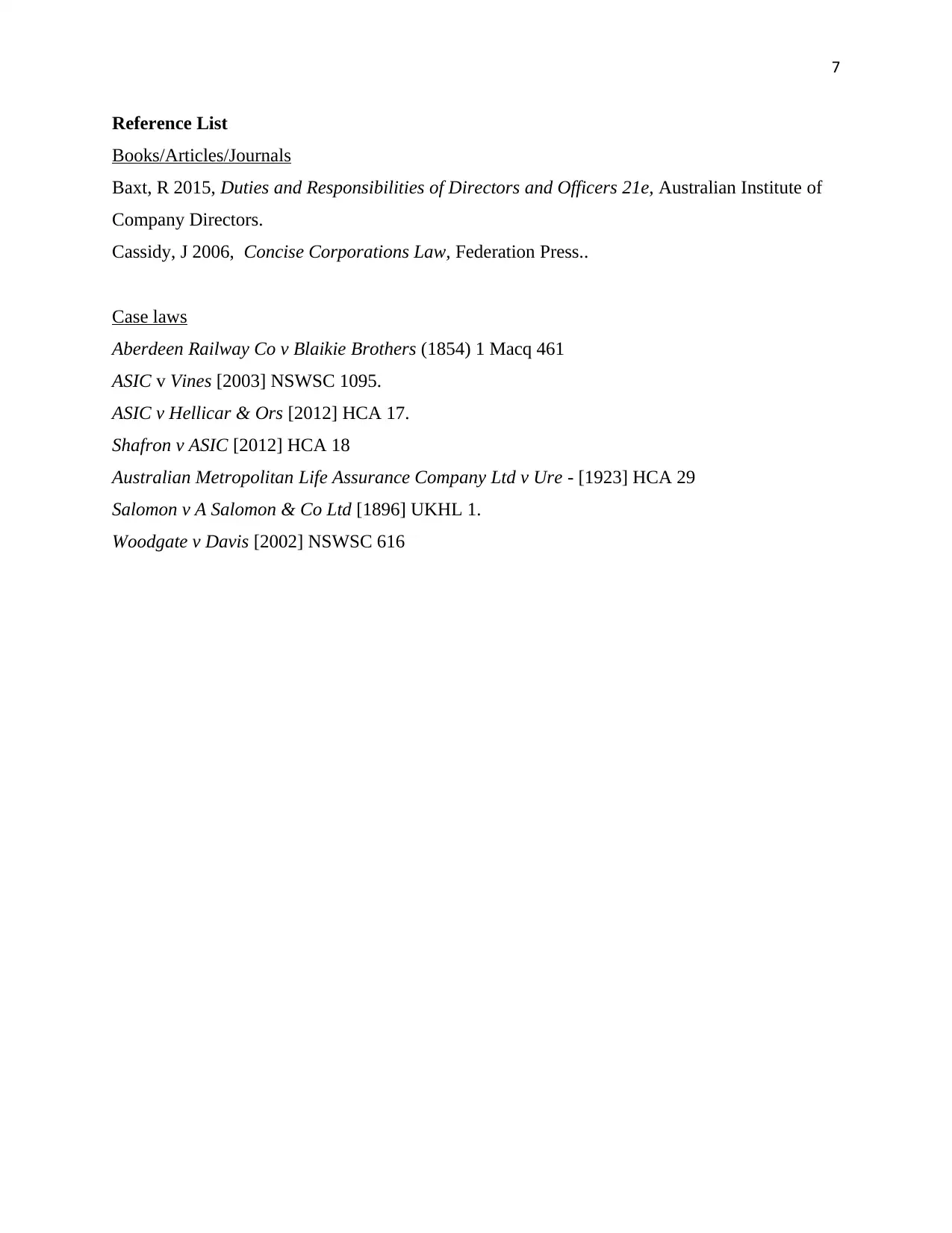
7
Reference List
Books/Articles/Journals
Baxt, R 2015, Duties and Responsibilities of Directors and Officers 21e, Australian Institute of
Company Directors.
Cassidy, J 2006, Concise Corporations Law, Federation Press..
Case laws
Aberdeen Railway Co v Blaikie Brothers (1854) 1 Macq 461
ASIC v Vines [2003] NSWSC 1095.
ASIC v Hellicar & Ors [2012] HCA 17.
Shafron v ASIC [2012] HCA 18
Australian Metropolitan Life Assurance Company Ltd v Ure - [1923] HCA 29
Salomon v A Salomon & Co Ltd [1896] UKHL 1.
Woodgate v Davis [2002] NSWSC 616
Reference List
Books/Articles/Journals
Baxt, R 2015, Duties and Responsibilities of Directors and Officers 21e, Australian Institute of
Company Directors.
Cassidy, J 2006, Concise Corporations Law, Federation Press..
Case laws
Aberdeen Railway Co v Blaikie Brothers (1854) 1 Macq 461
ASIC v Vines [2003] NSWSC 1095.
ASIC v Hellicar & Ors [2012] HCA 17.
Shafron v ASIC [2012] HCA 18
Australian Metropolitan Life Assurance Company Ltd v Ure - [1923] HCA 29
Salomon v A Salomon & Co Ltd [1896] UKHL 1.
Woodgate v Davis [2002] NSWSC 616
1 out of 7
Related Documents
Your All-in-One AI-Powered Toolkit for Academic Success.
+13062052269
info@desklib.com
Available 24*7 on WhatsApp / Email
![[object Object]](/_next/static/media/star-bottom.7253800d.svg)
Unlock your academic potential
Copyright © 2020–2026 A2Z Services. All Rights Reserved. Developed and managed by ZUCOL.





